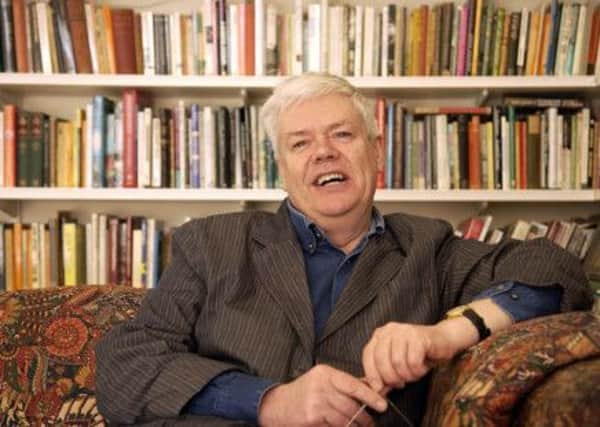Book review: Collected Stories, Bernard MacLaverty


COLLECTED STORIES
by BERNARD MacLAVERTY
Jonathan Cape, 640pp, £20
There are two distinct types of short stories, and although there are also many that occupy a middle land between the two, the distinction is worth making. The first is the anecdote, the kind of story which, once you have read it, you can tell again in your own words. You won’t tell it as well, but you can tell it interestingly enough. Guy de Maupassant was a master of this sort of story; Somerset Maugham also. Some of Kipling’s come in this category too, though most of them don’t, and they will all lose more than, say, Maugham’s in any re-telling.
The second kind of story may be called a mood piece. Superficially nothing much may seem to happen, and there is seldom any twist in the tale, but nevertheless you are aware that there is a shift in the tale, something displaced. Chekhov is the master here, and in our own time William Trevor.
Advertisement
Hide AdTrevor is, of course, Irish, and Irish writers often seem to be especially gifted at this kind of thing. I don’t know why. Perhaps there is something inconclusive, something hard to grasp, in Irish life.
Bernard MacLaverty is Irish too, though from the north, not the south like Trevor; and he is in Trevor’s class.
Take, for instance, A Silent Retreat, which comes from his 1994 collection, Walking the Dog. It tells of an encounter between Declan, a boy at a Catholic boarding-school, and a B-Special constable, guarding the perimeter of the jail wall which “was so high it created echoes”. They meet when Declan crosses the fence to retrieve a football, and they have a couple of later meetings in which they exchange cigarettes.
They also exchange opinions, but the gulf between their positions is too wide to bridge. When Declan is asked if he is a Republican and replies that he would “like to see a United Ireland”, he gets the reply, “How could you have a United Ireland with you and me in it?”
The B Special, “who looks as if he is 19 but was probably older” , tells Declan: “You’re the first Roman Catholic I’ve ever talked to – except for one guy in work.” They argue about religion, and there is no meeting-place, or common ground. The B-special’s last words are “F*** the future.”
The desolation of Belfast in the 1970s is captured within this story. It is intelligent and moving but, as you see, when I attempt to re-tell it or give you its gist, it can’t be done. The thing falls apart, whereas in the reading it holds perfectly together.
Advertisement
Hide AdThere’s another story, In the Hills above Lugano, which is disturbing and sad, in part because nothing is spelled out, and the narrator’s version of events may be unreliable. He visits an old friend who has taken a holiday villa and is living there with the beautiful girl to whom he may, or may not, be married. There is unhappiness and thwarted aspirations, tenderness and pain. The narrator is compromised and nothing is as he thought or hoped it would be. What seemed like a magic, if fleeting, moment threatens him with permanence. He runs away. We are left wondering which of the two versions of his hosts’ relationship he has been offered is to be trusted. It’s a story hard to get hold of, yet one which lingers bitter-sweet in the memory.
Bitter-sweetness is the mood of many of these stories. MacLaverty is a generous and sympathetic writer, one who is capable of celebrating joy and happiness, while remaining aware that life often brings more disappointments than rewards. Some of the stories would be bleak in a bald re-telling, but while they may be sad, they are never depressing. His characters are more often stoical than self-pitying. He has a tenderness for women, especially old ones, who keep going and do what they think is their duty, no matter their circumstances. He can depict goodness without lapsing into sentimentality.
Advertisement
Hide AdThere is humour too, sometimes grim as in The Trojan Sofa, which ends with the narrator’s father declaring that a news story about an English architect designing an oratory for some nuns was “a cover story – everybody in Intelligence had one. They like to keep us in the dark, he said.” So , doubtless, they do, but MacLaverty sheds light on his characters’ inner lives.
In his introduction which, unlike many such things, is worth reading, he tells us of how he was reared in an atmosphere of Catholic piety, serving as an altar-boy, and being shielded from unpleasantness by his mother for whom “everything had to be done nicely”. He had lost his childhood faith long ago. Yet the fact is that then “religion both terrified and elevated me …. The fact that I don’t believe a word of it now doesn’t diminish the effect it had on me.”
One consequence is that he “grew up knowing things represented other things”. Nothing is necessarily only what it seems to be. ”This can only be good,” he writes, “for someone who is going to be a writer.”
Everything in this rich collection of stories points up this truth, that people’s lives exist in different ways: as they see themselves and as others see them. We get each other wrong and we get ourselves wrong too. But told well a story can make sense of our fractured reality – even, or perhaps most of all, a story that suffers in the re-telling, but exists properly only in the well-chosen words.